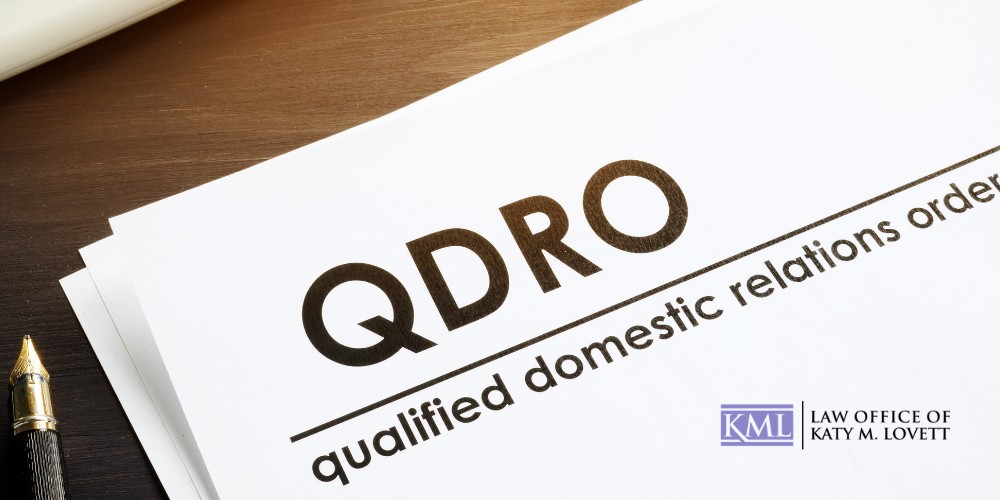QDRO Attorney in Texas
Home » Round Rock Family Law Attorney » QDRO Attorney in Texas
Practice Areas

If you are going through a divorce and need a skilled QDRO (qualified domestic relations order) attorney in Texas to protect your share of retirement benefits, the Law Office of Katy M. Lovett, PLLC, is here to help. Serving clients throughout Williamson County, our experienced Round Rock family law attorney guides you through every step of the QDRO process so you can secure the retirement assets you are entitled to under the law.
We handle the preparation and review of qualified domestic relations orders, work with plan administrators, and make sure your retirement accounts, retirement plans, and other marital property are divided accurately. Whether your case involves a 401(k), pension, or other qualified retirement plan, attorney Katy M. Lovett provides clear guidance so you understand how your benefits will be paid. Call 512-956-5356 or contact us online today to get started and secure the funds you have worked hard to earn.
What is a QDRO?
A Qualified Domestic Relations Order (QDRO) is a special type of court order used in a divorce or legal separation to divide certain retirement accounts or retirement plans between the participant and a former spouse, or to pay retirement benefits for child support or spousal support.
Under federal law, a QDRO allows a qualified retirement plan, such as a 401(k), pension, or other retirement system, to pay benefits directly to an alternate payee without early withdrawal penalties. The order must include specific information, such as the names and last known mailing addresses of the parties, details about the retirement assets being divided, and instructions for the plan administrator.
Once approved by the court and pre-approved by the plan administrator, the QDRO ensures that funds are properly allocated and paid according to the agreement in the final divorce decree.
When Do You Need a QDRO in Texas?

You need a QDRO in Texas when your divorce or legal separation involves dividing retirement benefits from a qualified retirement plan such as a 401(k), pension, or other employer-sponsored retirement accounts. A QDRO is also required when retirement assets must be used to pay benefits for child support or spousal support.
In many divorce proceedings, the QDRO is prepared after the final decree is issued. However, it’s important to start the QDRO process as soon as possible to avoid delays in payments. Without a QDRO, plan administrators cannot legally release funds to an alternate payee, even if the court order says the former spouse or other party is entitled to the money.
If your marital property includes any qualified retirement plans, working with an experienced QDRO attorney ensures your order is accurate, compliant with federal law, and ready for timely approval.
How QDROs Work in Texas
In Texas, a Qualified Domestic Relations Order (QDRO) works by creating a legally binding court order that directs a retirement plan to pay benefits to an alternate payee, such as a former spouse or a child, as part of the divorce process.
The QDRO process begins by preparing the order to include all required specific information, such as the names and mailing addresses of the parties, the type of retirement accounts or plans involved, and the exact amount or percentage of benefits to be paid. The order is then submitted to the court for approval and sent to the plan administrator for review and pre-approval.
Once approved, the plan administrator will arrange for the payments to be made from the participant’s account to the alternate payee. This process ensures the retirement assets are divided according to the final decree and in compliance with federal law and plan rules.
Common Types of Retirement Plans Covered by QDROs

There are several different types of retirement plans that may be divided through a qualified domestic relations order (QDRO) in a Texas divorce. Each plan type has its own rules, plan administrators, and procedures for approving and paying benefits to an alternate payee.
- Private Employer-Sponsored Retirement Plans: These include 401(k) accounts, profit-sharing plans, and pensions from private companies. A qualified domestic relations order is often needed to divide these retirement accounts between a participant and a former spouse or alternate payee.
- State and Local Government Retirement Plans: Many public employees in Texas participate in retirement systems like the Texas Retirement System (TRS) or the Texas County and District Retirement System (TCDRS). These retirement plans have specific QDRO requirements, and plan administrators must often pre-approve the order.
- Federal Retirement Plans: Federal employees with benefits through the Federal Employees Retirement System (FERS) or the Civil Service Retirement System (CSRS) must use orders similar to QDROs to divide retirement assets during the divorce process, in compliance with federal law.
- Military Pensions: Military retirement benefits are divided under both federal law and military-specific rules to ensure payments are correctly made to the alternate payee in a Texas divorce.
Understanding the QDRO Process in Texas

The QDRO process in Texas involves several important steps to ensure retirement benefits are divided correctly during a divorce or legal separation. From the first meeting with your Round Rock QDRO attorney to the final confirmation that funds are paid to the correct alternate payee, each stage requires careful attention to detail and compliance with both federal law and retirement plan rules.
Personalized Consultation and Case Review
At the Law Office of Katy M. Lovett, your QDRO attorney will review your divorce decree, identify the retirement accounts or retirement plans to be divided, and discuss your goals. This step ensures you understand how the QDRO will affect your retirement assets and benefits, including any tax or timing considerations. It also allows your QDRO attorney to explain your rights as a former spouse or alternate payee under federal law.
Collecting Plan and Account Information
Following your consultation, your QDRO attorney will gather specific information, including plan documents, account statements, and the last known mailing address for each party. Your attorney will also obtain any plan-specific QDRO guidelines from the plan administrator to ensure compliance.
Drafting a Precise and Compliant QDRO in Texas
Once all required information has been collected, a detailed qualified domestic relations order is prepared to meet Texas legal standards and the specific rules of your qualified retirement plan. The draft will clearly identify the participant, the alternate payee, and the exact share of retirement benefits to be distributed.
Filing the QDRO with the Court
The completed order is then submitted to the court for review and approval. Once signed by the judge, it becomes a binding court order directing the retirement plan to pay benefits as outlined. Filing at the right stage in the divorce process, often alongside the final decree, can help avoid costly delays in receiving your share of the retirement assets.
Coordinating with the Plan Administrator
The signed QDRO is sent to the plan administrator for review and pre-approval. If the plan administrator requires changes, your QDRO attorney will make the necessary adjustments so the order fully complies with the plan’s rules.
Finalizing and Verifying Benefit Division
Once approved, the plan administrator arranges for payments to the alternate payee in accordance with the QDRO. Your QDRO attorney, Katy M. Lovett, will confirm that the funds are paid correctly, that all terms match the final decree, and that your retirement assets are fully protected moving forward.
Texas Qualified Domestic Relations Order FAQs
Do You Need a QDRO for a 401(k)?
A qualified domestic relations order (QDRO) is required under federal law to divide a 401(k) between a participant and a former spouse or alternate payee during a Texas divorce. Without a QDRO, the plan administrator cannot legally pay benefits directly to anyone other than the account holder.
Can a QDRO Be Used to Collect Unpaid Child Support in Texas?
In Texas, a QDRO can direct a qualified retirement plan to use the participant’s retirement benefits to pay unpaid child support or spousal support. This allows funds to be distributed directly from the retirement account to the person owed support.
Who Qualifies as an Alternate Payee in a QDRO?
An alternate payee can be a former spouse, a child, or another dependent entitled to receive retirement benefits under a qualified domestic relations order. The alternate payee is specifically named in the QDRO and approved by the plan administrator.
Do I Need a QDRO for All Retirement Accounts?
A QDRO is required for most qualified retirement plans, such as 401(k) accounts and pensions, but not for IRAs. Different types of retirement accounts have different rules, so it’s important to confirm with an attorney and the plan administrator.
Can I Prepare a QDRO After My Divorce is Final?
Yes, but it’s best to complete the QDRO process during the divorce proceedings. Preparing it after the final decree is possible, but waiting can cause delays, missing information, or problems if the retirement assets have already been distributed.
Protect Your Retirement Rights with Round Rock QDRO Lawyer Katy M. Lovett

The division of retirement benefits can be one of the most complex parts of a Texas divorce, and having the right QDRO attorney can make all the difference. At the Law Office of Katy M. Lovett, PLLC, we guide clients in Round Rock through every step of the QDRO process.
Whether your case involves a 401(k), pension, or other qualified retirement plan, we work to ensure your retirement assets are divided accurately and your benefits are paid according to the final decree. Call Law Office of Katy M. Lovett, PLLC, today at 512-956-5356 or use our online contact form to schedule a consultation with our experienced QDRO attorney.

At the Law Office of Katy M. Lovett, PLLC, you are not just a case number. Our family law attorney takes the time to listen to your concerns, understand your goals, and develop a strategic approach that aligns with your needs under Texas law.
